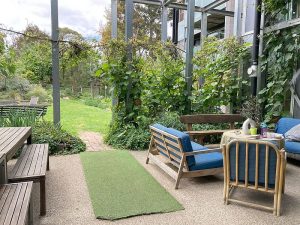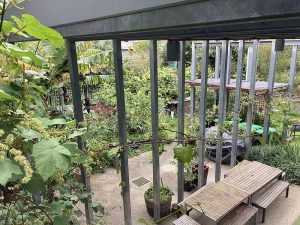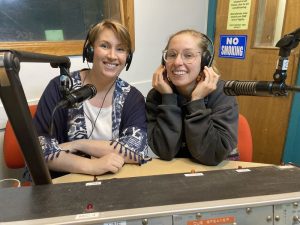Thanks to the people who have contributed to this week’s newsletter: Ann Stanley, Bruce Plain, Maude Farrugia, Nathacha Subero, Pauline Webb and Rebecca Haschek.
The garden at Murundaka Co-housing Community (by Ann Stanley)
[Following a callout in a previous newsletter, Ann Stanley recently visited the Murundaka Co-housing Community in Heidelberg Heights, walked round its garden with one of its residents, Sarah Swierzy, and then interviewed Sarah plus fellow resident Collette Couper. Ann’s full writeup of the garden visit is available on our website, with a shortened version below. Her interview with Collette and Sarah is available as a podcast on the 3CR radio website. Would you like Ann to visit your community garden? If so, email us.]
The Murundaka Cohousing Community is an all-rental, values-based, intentional community in Heidelberg Heights. The co-operative was established in 2011. There is a block of 18 custom-built apartments, with 2 free standing houses in neighbouring streets. This, and similar initiatives, are trying to address all of the problems of environmental sustainability, the shortage of housing and unaffordable rents.
Murundaka has a huge, rambling garden. This begins at the back door of the Common House, a large, custom-built space with two big sinks, plenty of bench space, tables, a wood burning heater, and cosy zones built around couches, bookshelves, art and a kids’ play area.
On the adjoining patio there is a comfortable seating area. A banana tree with a hand of still-green fruit enjoys the warmth of a north-facing wall of the apartment building where most of the residents live. There is a firepit.
Deeper into the garden is a large mulberry tree which the residents had recently spent an afternoon shaking to gather the fruit on a huge tarpaulin, but the tree was still laden, and the ground strewn with large juicy mulberries. Collette told me that mulberries had been, for a couple of weeks, a feature of the desserts at the common meal that takes place every Friday in the Common House.
The garden is well-planned and cared-for. The soil has been fed by the large composting system and worm farm and mature fruit trees now yield avocados, cherries, pears, cherry guava, apples, citrus fruits, apricots, other stone fruits, kiwifruit, grapes and feijoas.
There are individual veggie plots, in various states of cropping, with the last of the winter veggies going to seed and new seedlings ready for the warmth of summer. There is also a communal veggie plot.
At the end of the garden, there is a large chicken pen, empty of residents pending fox-proof renovation. The adjacent forage area is wild with borage and other volunteer plants, including edible weeds and herbs that have thrived on neglect.
There is a gardening committee that takes responsibility for the garden, organising gardening bees on the days of the monthly whole group meeting. Some of the residents are horticulturists and permaculture enthusiasts.
Murundaka is a local Wurundjeri word meaning ‘a place to stay or live.’ If living in a community means commitment to shared responsibility, sustainability and growing fresh food, the Murundaka co-housing community is an inspiring model of what could be the future of housing in Melbourne and in cities all over the world.
Read Ann’s full writeup of the Murundaka garden on our website.
Local Food Connect’s 2023 annual report
Some newsletter reader tips
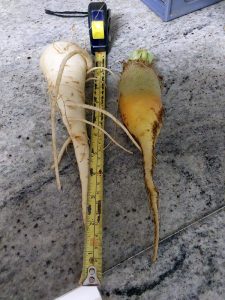 Pauline Webb on parsnips and mangelwurzel
Pauline Webb on parsnips and mangelwurzel
The photo shows two root vegetables. The left hand vegetable is a 28cm parsnip that I (Pauline) recently pulled up. Note that the end broke where it had gone below the loam into clay.
The right hand vegetable is a mangelwurzel [editor: a variety of beetroot]. It is my first mangelwurzel ever. When I heard Jerry (Brisbane) on Gardening Australia talk about them, I was fascinated. I’m sure his grew very large but I am happy with my first attempt.
Bruce Plain on rats and carnivore urine
Some researchers at Harvard Medical School have recently published an article entitled The smell of danger: rats instinctively avoid compound in carnivore urine. Here’s the summary: “Researchers have discovered a single compound found in high concentrations in the urine of carnivores that triggers an instinctual avoidance response in mice and rats. This is the first time that scientists have identified a chemical tag that would let rodents sense carnivores in general from a safe distance.”
Read some other newsletter reader tips on our website.
As I said last week, I (Guy) think that tips from newsletter readers really add to the newsletter so, if you have any, send them in by email.
Can you advise?
Rebecca Haschek is on holiday, returning end November, and she hasn’t yet planted her summer vegetables. In fact, her vegetable plot is currently a mixture of overgrown parsley and kikuyu grass. What should she be doing in early December when she is back and can spend some time in the garden? Are there any summer crops she should plant or would it be better to focus on preparing for autumn sowing? Email your advice.
Want to volunteer?
Strathdon House and Orchard Precinct in Forest Hill is seeking volunteers to help out with their garden. They grow a variety of vegetables and herbs in raised garden beds as well as some decorative plants. The volunteers decide on the various plantings and rotations. They are, of course, able to harvest produce for their own use. If you are potentially interested, contact Megan McMahon by phone (8873 9121, Wed-Fri) or email (megan.mcmahon@whitehorse.vic.gov.au).
The Coburg Community Garden Festival
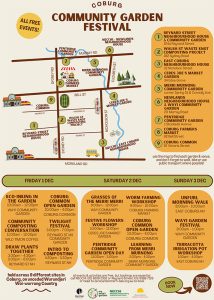 I realised a week or so ago that there were a lot of free, upcoming events in Coburg on Friday 1st, Saturday 2nd and Sunday 3rd December. But it is only this week that it has been pointed out to me (thanks, Nathacha!) that these are all part of something called the Coburg Community Garden Festival. In total, there are 15 events across 9 sites, with the following 7 of these being directly food-related:
I realised a week or so ago that there were a lot of free, upcoming events in Coburg on Friday 1st, Saturday 2nd and Sunday 3rd December. But it is only this week that it has been pointed out to me (thanks, Nathacha!) that these are all part of something called the Coburg Community Garden Festival. In total, there are 15 events across 9 sites, with the following 7 of these being directly food-related:
- Coburg Common open garden; Friday, 1st December, 10am-4pm; free; Coburg.
- Community composting conversation; Friday, 1st December, 11am-midday; free; Coburg.
- Twilight garden festival; Friday, 1st December, 3-7pm; free; Coburg.
- Intro to composting; Friday, 1st December, 4.30-5.30pm; free; Coburg.
- Worm farming workshop; Saturday, 2nd December, 10-11am; free; Coburg.
- Coburg Common open garden; Saturday, 2nd December, 10am-4pm; free; Coburg.
- Pentridge Community Garden open day; Saturday, 2nd December, 11am-3pm; free; Coburg.
To read more, go to the Zero Carbon Merri-bek website.
In passing, whilst I was on the Zero Carbon Merri-bek website, I noticed that an organisation called Green my Plate had recently won Merri-bek’s 2023 EPA Waste prevention and reduction award. Green my Plate “supply reusable, light-weight, plates and bowls to events, schools and anyone else wanting to minimise their waste.” Watch this 40 second video.
The Rs of waste management
City of Yarra Council has published a ‘circular economy map’ which shows the businesses and community initiatives in Yarra that are working to reduce waste and extend the use of resources. The categories of organisation are: regenerate & renew; refuse & reduce; reduce & repurpose; repair & restore; and recycle & recover.
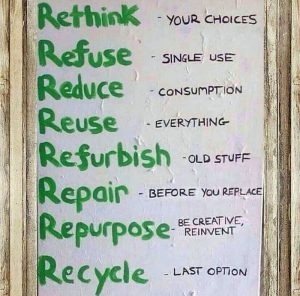 Related to this, I recently came across the graphic right, which was entitled the 8 Rs of waste management.
Related to this, I recently came across the graphic right, which was entitled the 8 Rs of waste management.
Then my memory kicked in and I remembered seeing other similar lists but with more, less or different Rs. A quick piece of Googling revealed that these lists can contain any of the following:
- Recover.
- Recycle.
- Reduce.
- Refill.
- Refurbish.
- Refuse.
- Regenerate.
- Regift.
- Remember.
- Repair.
- Repurpose.
- Respect.
- Restore.
- Rethink.
- Return.
- Reuse.
Then my mind kicked in. Obviously, in at least some of the cases, the ‘re’ is a prefix which means ‘again’. For example, reuse = re-use = to use again. But what about reduce (how does one ‘duce’ again)? Some more Googling revealed that, in terms of their derivation, the 15 Rs above can be grouped into three linguistic categories:
- Where the ‘re’ is a prefix for a commonly used word and where the concatenated meaning is to do that word again. Refill, regift, repurpose, rethink, reuse. Such words can be spelt with or without a hyphen (e.g. ‘re-use’ or ‘reuse’).
- As above but where the concatenated word has become as commonly used as, and totally distinct from, the original word. Recycle, refurbish, regenerate, return. No hyphens allowed.
- Where the ‘re’ is again a prefix to a Latin word, and means to do that word again, but where the Latin word never made it into the English language. For example, ‘respect’ comes from the Latin ‘respicere’, where ‘spicere’ meant ‘to look at’. Obviously no hyphens allowed.
Finally, what do you think of as the 3Rs? According to Wikipedia, they can be any of:
- In teaching: reading, writing and arithmetic.
- In sustainability: reduce, reuse, and recycle.
- In animal welfare: reduction, refinement and replacement.
- In IT: rapid, reliable and repeatable.
The Melbourne ‘Local Food Connections’ community radio show
On this upcoming Sunday’s episode, Ann Stanley will chat with Claire about the 12 principles of permaculture.
Listen on 3CR (855 AM) on Sunday morning, 10-10.30am, by tuning into either the station (855 AM) or its livestream.
Podcasts of previous episodes are available on their website. These are now proper podcasts, including titles and descriptions.
Which link was clicked most times in the last newsletter?
The most popular link in the last newsletter was the profile of Anna Matilda, the Urban Nanna..
 Joke (or pun) of the week
Joke (or pun) of the week
I made some Indian food for dinner last night. I told my wife that I’d used butter but wished I’d had some ghee instead. She looked at me quizzically, and I continued “because it’s more traditionally Indian.”
“Ah,” she replied. “Thanks for clarifying.”
Regular activities over the coming week
Farmers’ and other food markets
- Friday: Community Grocer, Carlton and Farm Raiser farmgate (Bellfield).
- Saturday: Carlton, Coburg and Farm Raiser farmgate (Bellfield).
- Sunday: Alphington, Eltham and Yarra Valley.
- Tuesday: Community Grocer, Fitzroy.
- next Wednesday: Really Really Free Market (Coburg).
Food swaps
- Saturday: Box Hill South, Brunswick East, Bulleen, Diamond Creek, Fairfield, Forest Hill, Greensborough, Joe’s Market Garden (Coburg), Macleod, North Coburg and Reservoir.
- Sunday: Ringwood, St Andrews and Surrey Hills / Balwyn,.
Community gardens
- Thursday: Buna (Heidelberg West), Diamond Valley Library (Greensborough), Edible Hub (Hurstbridge), SEEDs (Brunswick) and Whittlesea.
- Friday: Reynard Street (Coburg) and West Brunswick.
- Saturday: Bellfield (composting workshop and garden tour), Links (Lalor), Macleod and Thrive (Diamond Creek).
- Sunday: Bellfield, Croxton/Marra Guwiyap (Northcote), Fawkner Food Bowls, Pentridge (Coburg), Regent (Reservoir) and St Johns (Heidelberg).
- Monday: Panton Hill, SEEDs (Brunswick) and Whittlesea.
- Tuesday: Doncaster Hill and Watsonia.
- Next Wednesday: Bellfield, Eltham Neighbourhood House, Macleod, Newton Street (Reservoir), Span (Thornbury) and Sylvester Hive (Preston) .
Upcoming face-to-face events – not cooking
The placemaking festival; Saturday, 18th November, 10am-3pm; free; Coburg.
Enjoy various workshops, food and live music. The activities include: bushfoods by Joanne Russell (10-11am); a mindful guided walk (11am-midday); creating an indigenous plants corridor (midday-3pm); and kids painting and play workshops (1-3pm). There will also be a plant sale from 11am to 2pm. Organised by Reynard Street Neighbourhood House. Click here to read about the community garden.
Rosanna Primary School old school fair; Saturday, 18th November, 2-7pm; free; Rosanna.
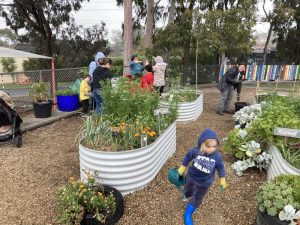 There will be craft stalls, a silent auction, children’s rides & activities, live music and food & beverages. The Rosanna Primary Garden Club have been working hard to grow plenty of summer seedlings for sale and to create bush crafts. They will have lots of edibles, natives, flowers and indoor plants propagated by the kids and parent volunteers, as well as pot decorating and fairy garden making activities for the children.
There will be craft stalls, a silent auction, children’s rides & activities, live music and food & beverages. The Rosanna Primary Garden Club have been working hard to grow plenty of summer seedlings for sale and to create bush crafts. They will have lots of edibles, natives, flowers and indoor plants propagated by the kids and parent volunteers, as well as pot decorating and fairy garden making activities for the children.
Tour of Collingwood Children’s Farm; Saturday, 25th November, 10am-12.30pm; $27 ($11 per hour); Abbotsford.
Join a walking tour of their market style garden, cut flower production and native food production. Then join their Animal Husbandry team on a walking tour to learn about animal production systems operating in an urban environment with a regenerative agriculture framework and how they balance production goals with social impact and environmental sustainability. Learn about how animal production and small scale farming can be adapted to small blocks of land or even your own backyard.
Intro to home brew; Saturday, 25th November, 3-5pm; $6; Hurstbridge.
Part 1, 3-4pm – Getting started: what/where/how (e.g. a brief history of beer and the key ingredients, with samples to touch and smell); equipment required (e.g. kits, bottling gear, best places to buy them); tips for optimal fermentation; and brewing outcomes and variances in flavour. Part 2, 4-5pm – Next steps: where does home brewing lead (e.g. improving processes and beer quality); better equipment (e.g. fridges to control temperature, kegs rather than bottles, kegerators); and competitions, social and other outcomes. Beginners should feel free to just attend the first part. Current home brewers should feel free to just attend the second part. Facilitated by (T)Hursty Brewers Homebrew Club, more specifically Brian Jones, David Morton, Holger Detje and Jo Skuse.
Panel discussion; Wednesday, 29th November, 5.30-8pm; $27 ($11 per hour); Abbotsford.
Listen to some industry experts from across the supply chain discuss connecting with where our food comes from and aiming to provide the best possible product for consumers in an ethical manner. Mediator: Chris Williams. After the discussion, there will be time for networking and conversation plus a selection of light food and beverages.
Twilight garden festival; Friday, 1st December, 3-7pm; free; Coburg.
Immerse yourself in an array of activities, including: 3-4pm – how to create gardens for wildlife; 3.30–4.30pm and 5–6pm – draw plants together; 3.30-5.30pm – learn how to build an insect hotel; and 4.30-5.30pm – intro to composting. Music, food and plant sales will be available throughout. Organised by Reynard Street Neighbourhood House. Click here to read about the community garden.
In November
- Smart storage to reduce food waste workshop; Thursday, 16th November, 6.30-7.30pm; free; Ringwood.
- Kitchen medicine – garden farmacy; Saturday, 18th November, 10am-2.30pm; $120 ($27 per hour); CERES.
- The placemaking festival; Saturday, 18th November, 10am-3pm; free; Coburg.
- Working with water with Dan; Saturday, 18th November, 10am-3.30pm; $15 ($3 per hour); Edendale.
- Composting workshop and community garden tour; Saturday, 18th November, 10.30am-12.30pm; free; Bellfield.
- Mushroom farm tour; Saturday, 18th November, 2-2.30pm; $27 ($54 per hour); Alphington.
- Rosanna Primary School old school fair; Saturday, 18th November, 2-7pm; free; Rosanna.
- Forage gardening workshop; Sunday, 19th November, 10am-12.30pm; $50 ($20 per hour); Pascoe Vale South.
- Farm Raiser tour, working bee and lunch; Sunday, 19th November, 10am-3pm; free; Bellfield.
- Eltham Wine Show; Sunday, 19th November, 10.30am-2.30pm; $20; Bulleen.
- Urban permaculture property garden tour; Sunday, 19th November, 3-5pm; $10; Kilsyth.
- Beginner beekeeping; Thursday, 23rd November, 10.30-11.30am; free; Nunawading.
- Growing native edibles; Thursday, 23rd November, 10.30am-midday; free; Carlton North.
- Banyule’s Urban Food Strategy launch; Thursday, 23rd November, 6-8pm; free; Bellfield.
- Beeswax wraps; Saturday, 25th November, 10am-midday; $80 ($40 per hour); CERES.
- Tour of Collingwood Children’s Farm; Saturday, 25th November, 10am-12.30pm; $27 ($11 per hour); Abbotsford.
- Community compost gathering; Saturday, 25th November, 2-5pm; free; Fitzroy.
- Intro to home brew; Saturday, 25th November, 3-5pm; $6; Hurstbridge.
- Awara open garden; Sunday, 26th November, 10-11.30am; $20 ($14 per hour); Pascoe Vale South.
- Beginners backyard beekeeping; Sunday, 26th November, 10am-3pm; $220 ($44 per hour); CERES.
- Mooroolbark Community Garden open day; Sunday, 26th November, 10am-3pm; free; Mooroolbark.
- In-depth mushroom cultivation workshop; Sunday, 26th November, 10am-4pm; $149 ($25 per hour); Alphington.
- Poultry and extreme heat; Sunday, 26th November, 10.15am-1.15pm; $64 ($21 per hour); Doreen.
- Gardening and planting workshop; Sunday, 26th November, 11am-1pm; free; Brunswick.
- Strathdon House and Orchard Precinct open day; Sunday, 26th November, 11am-2pm; free; Forest Hill.
- Warrandyte Community Garden open day; Sunday, 26th November, 1-4pm; free; Warrandyte.
- Worm farm – set your worms up for success; Sunday, 26th November, 1.45-3.15pm; free; Reservoir.
- The Veggie Empire urban farm tour; Tuesday, 28th November, 10-11.30am; $11; St Helena.
- Panel discussion; Wednesday, 29th November, 5.30-8pm; $27 ($11 per hour); Abbotsford.
- Urban Nanna’s festive hints and tips; Thursday, 30th November, 6-7.30pm; free; Ringwood.
In December
- Community composting conversation; Friday, 1st December, 11am-midday; free; Coburg.
- Twilight garden festival; Friday, 1st December, 3-7pm; free; Coburg.
- Intro to composting; Friday, 1st December, 4.30-5.30pm; free; Coburg.
- Introduction to beekeeping (2 sessions); Saturday, 2nd December, 9.30am-4.30pm and Saturday, 9th December, 10am-12.30pm; $225 ($24 per hour); St Helena.
- Worm farming workshop; Saturday, 2nd December, 10-11am; free; Coburg.
- Summer fruit tree pruning with Chris England; Saturday, 2nd December, 10am-1pm; $65 ($22 per hour); Burnley.
- Plant to harvest; Saturday, 2nd December, midday-1pm; free; Macleod.
- Plants and permaculture; Sunday, 3rd December, 10am-3pm; $120 ($24 per hour); CERES.
- The Veggie Empire urban farm tour; Sunday, 3rd December, 11am-midday; $11; St Helena.
- Preparing for the summer harvest with Teresa Day; Wednesday, 6th December, 6.30-8.30pm; free; Doncaster.
- Forage walk; Saturday, 9th December, 10am-midday; $35 ($18 per hour); Coburg.
- DIY mushrooms; Saturday, 9th December, 10am-4pm; $175 ($29 per hour); CERES.
Regular events
- Beekeeping workshop; roughly once a month on Saturdays, 1-3.30pm; $85 ($34 per hour); Brunswick East.
- Carlton aperitvio food tour; every Friday, 5-7pm; $139 ($70 per hour); Carlton.
- Classic cocktails; various Tuesdays, 7-10pm; $70 ($23 per hour); Fitzroy.
- Edible Forest tours; every Friday and Saturday, 11am-1pm and again at 1-3pm; $25 ($13 per hour); Dixons Creek.
- Eltham trails (walking food tour); various Saturday mornings and Thursday evenings; $65 ($22 per hour); Eltham.
- Flavours of Coburg food tour; 3rd Saturday of each month, 10am-1pm; $65 ($22 per hour); Coburg.
- Gin making masterclass; most Saturdays, 10am-1pm; $175 ($58 per hour); Nunawading.
- Gin masterclass; most Saturdays and Sundays, midday-1pm; $80 ($80 per hour); Eltham.
- Ratio Cocoa Roasters behind the scenes chocolate factory tour; various Fridays and Saturdays; $20 ($14 per hour); Brunswick.
- Truffle workshop at Ratio Cocoa Roasters; 3rd Sunday of each month, 11am-1pm; $75 ($38 per hour); Brunswick.
- Wine tasting; various days, times and prices; Abbotsford.
- Wine tasting; various Saturdays, 7-10pm; $130 ($43 per hour); Brunswick.
- Wine tasting; various Saturdays, 3-5pm; various prices; Northcote.
- Wine tasting; various Saturdays, 3-4pm; $86 ($86 per hour); Preston.
Upcoming face-to-face events – cooking
Summer desserts class; Friday, 24th November, 10am-12.30pm; $190 ($76 per hour); Diamond Creek.
Jade, from My Pantry Door, will guide you through the process of making a variety of summer-themed desserts, including gin-infused berry cheesecake pots and chocolate-filled choux pastry.
Christmas tree cake class; Sunday, 3rd December, 1-4pm; $245 ($82 per hour); Diamond Creek.
Jade, from My Pantry Door, will guide you through the process of making Christmas tree cakes. You will also decorate your own cake to take home.
No waste cooking demonstration with Open Table; Saturday, 9th December, 10-11am; free; Reservoir.
Open Table will discuss how to reduce food waste whilst demonstrating how to cook use-it-up potato salad croquettes and panzanella salad.
Christmas cupcake class; Wednesday, 13th December, 10am-12.30pm; $145 ($58 per hour); Diamond Creek.
Jade, from My Pantry Door, will guide you through the process of making swiss meringue buttercream, colouring buttercream, and using piping skills to create simple bespoke and festive designed cupcakes. You will also get to take home 6 vanilla cupcakes decorated by you.
Gingerbread cookie house workshop; Saturday, 16th December, 1-2.30pm; $65 ($44 per hour); Forest Hill.
Erika will show you how to decorate your own holiday gingerbread house.
In November
- Dumpling making workshop; Friday, 17th November, 6.30-8.30pm; $75 ($38 per hour); Park Orchards.
- Miso ball making class; Friday, 17th November, 7-9pm; $50 ($25 per hour); Fitzroy North.
- Christmas pudding making workshop; Saturday, 18th November, 10am-midday; $15; Watsonia.
- Cooking with bean curd; Saturday, 18th November, 10am-midday; $25 ($13 per hour); Forest Hill.
- Colombian cooking workshop; Saturday, 18th November, 10am-1pm; $65 ($22 per hour); Balwyn North.
- Sourdough breadmaking (2 sessions); on Saturdays, 18th and 25th November, both 10am-12.30pm; $150 ($30 per hour); Park Orchards.
- Christmas cookie decorating; Saturday, 18th November, 1-4pm; $50 ($17 per hour); Ringwood North.
- Cosmo cupcake soiree; Saturday, 18th November, 5-7pm; $75 ($38 per hour); Ivanhoe.
- Marinating; Tuesday, 21st November, 6-8.30pm; $65 ($26 per hour); Hawthorn.
- Gnocchi making demonstration; Tuesday, 21st November, 6.45-8pm; free; Coburg.
- Gingerbread house workshop; Tuesday, 21st November, 7-8.30pm; $30 ($20 per hour); Greensborough.
- Summer desserts class; Friday, 24th November, 10am-12.30pm; $190 ($76 per hour); Diamond Creek.
- The art of chocolate masterclass at Pidapipo Laboratorio; Saturday, 25th November, 10am-midday; $150 ($75 per hour); Fitzroy.
- Kimchi workshop; Saturday, 25th November, 10am-midday; $52 ($26 per hour); Lower Templestowe.
- Jam and pickles workshop; Saturday, 25th November, 1-3pm; $50 ($25 per hour); Lower Templestowe.
- Gluten-free kitchen skills; Sunday, 26th November, 10am-3pm; $120 ($24 per hour); CERES.
- Thai condiments made simple; Sunday, 26th November, 10.30am-3pm; $180 ($40 per hour); Panton Hill.
- I can’t believe it’s vegan!; Wednesday, 29th November, 10am-12.30pm; $35 ($14 per hour); Balwyn North.
- Easy recipes on a budget with Open Table; Wednesday, 29th November, 4-5pm; free; Carlton.
In December
- Buche de noel workshop; Friday, 1st December, 6-9pm; $91 ($30 per hour); Lower Templestowe.
- Kombucha, jun, water kefir, wild mead and beet kvass; Friday, 1st December, 6.30-8.30pm; $180 ($90 per hour); Fitzroy North.
- Sourdough breadmaking; Saturday, 2nd December, 10am-12.30pm; $71 ($28 per hour); Lower Templestowe.
- Baking for Christmas; Saturday, 2nd December, 10am-2pm; free; Kilsyth.
- Authentic Mexican; Saturday, 2nd December, 10am-3pm; $120 ($24 per hour); CERES.
- Sourdough bread baking; Sunday, 3rd December, 9am-5pm; $190 ($24 per hour); CERES.
- Christmas tree cake class; Sunday, 3rd December, 1-4pm; $245 ($82 per hour); Diamond Creek.
- Gluten-free Christmas baking; Wednesday, 6th December, 10am-12.30pm; $35 ($14 per hour); Balwyn North.
- Get your dad in the kitchen!; Wednesday, 6th December, 4-6pm; free; Hawthorn.
- Indian cooking – Punjabi (2 sessions); Wednesdays, 6th and 13th December, both 6.30-8.30pm; $99 ($25 per hour); Hurstbridge.
- Christmas cooking gift ideas; Friday, 8th December, 1.30-3pm; free; Greensborough.
- Gingerbread house for adults; Friday, 8th December, 6-9pm; $69 ($23 per hour); Lower Templestowe.
- St John’s Christmas gingerbread house making event; Friday, 8th December, 7.30-9.30pm; $40 ($20 per hour); Diamond Creek.
- No waste cooking demonstration with Open Table; Saturday, 9th December, 10-11am; free; Reservoir.
- Festive preserves; Saturday, 9th December, 10am-1pm; $81 ($27 per hour); Forest Hill.
- Christmas cookie creations; Saturday, 9th December, 10am-2pm; free; Kilsyth.
- Feta masterclass; Sunday, 10th December, 10am-3pm; $240 ($48 per hour); CERES.
- Gingerbread house decoration; Sunday, 10th December, 10.30am-midday; $50 ($34 per hour); Camberwell.
- Christmas cupcake class; Wednesday, 13th December, 10am-12.30pm; $145 ($58 per hour); Diamond Creek.
- Gingerbread house decorating workshop; Wednesday, 13th December, 1-3.30pm; free; Mill Park.
- Vegan chocolate making; Thursday, 14th December, 6.30-8pm; $80 ($53 per hour); Collingwood.
- Gingerbread house for children; Saturday, 16th December, 10-11.30am; $53 ($35 per hour); Lower Templestowe.
- Gingerbread cookie house workshop; Saturday, 16th December, 1-2.30pm; $65 ($44 per hour); Forest Hill.
- Gingerbread house decoration; Saturday, 16th December, 2-3.30pm; $50 ($34 per hour); Camberwell.
Regular classes
- Al dente cooking (Italian); most Saturdays, 9am-1pm; $155 ($39 per hour); Chirnside Park.
- BBQ classes; various days and times; $135-150 ($45-50 per hour); Brunswick East.
- Bread making; various Sundays, 8am-2pm; $230 ($38 per hour); Abbotsford.
- Brunswick Kitchen (many different classes); various dates, times and prices but mostly 2½ hours long and $120; Brunswick.
- Chocolate making and pastry classes for children; various days and times; various costs; Yarra Glen.
- Chocolate making workshop; various Thursdays, Fridays and Saturdays; $152 ($38 per hour); Blackburn.
- Chocolate making workshop; various Saturdays and Sundays; $125 ($63 per hour); Box Hill North.
- Kombucha brewing workshop; last Thursday of each month, 7-11pm; $49 ($12 per hour); Brunswick.
- La Cucina di Sandra (Italian); various evenings, 6.30-10.30pm; $120 ($30 per hour); Richmond.
- Margot & Montanez (alfajores biscuits); monthly on Sundays, 10am-1pm ; $109 ($36 per hour); Camberwell.
- Nonna & Mum’s cooking class; 4th Thursday of each month, 7-10pm; $24 ($8 per hour); Thornbury.
- Otao Kitchen (many different classes); various dates, times and prices but mostly 3 hours long and $197; Abbotsford.
- Rosa’s cooking classes (Italian); various Saturdays and Sundays, 10.15am-3pm; mostly $165 ($35 per hour); Bundoora.
- Sourdough bread workshop; roughly once a month on Saturdays, 9-11.30am; $185 ($74 per hour); Brunswick East.
- Taiwanese cooking; 1st Saturday of each month, midday-2.30pm; $126 ($50 per hour); Brunswick.
- Tea blending; various Sundays; $75 ($60 per hour); Brunswick.
- The ultimate biscuit class; various Tuesdays, 10am-3pm; $162 ($32 per hour); Blackburn.

